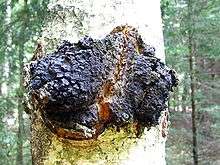chaga
English

The conk of Inonotus obliquus on a birchtree.
Noun
chaga (uncountable)
- A parasitic fungus of trees, usually birch, found on the circumboreal region of the Northern hemisphere, Inonotus obliquus.
- The irregular conk of this fungus, used in East European folk medicine to treat a number of conditions.
Synonyms
- (Inonotus obliquus): chaga mushroom
Further reading



Galician
Etymology
13th century. From Old Portuguese chaga (“sore, wound”), from Latin plāga (“injury”), from plangō, from Proto-Indo-European *plak-. Cognate with Spanish llaga.
Pronunciation
- IPA(key): /ˈt͡ʃaɣa̝/
Noun
chaga f (plural chagas)
- sore (injured, infected, inflamed, or diseased patch of skin)
- Synonym: úlcera
- open wound
- Synonym: ferida
Related terms
- praga
- chagar
References
- “chaga” in Dicionario de Dicionarios do galego medieval, SLI - ILGA 2006-2012.
- “chaga” in Xavier Varela Barreiro & Xavier Gómez Guinovart: Corpus Xelmírez - Corpus lingüístico da Galicia medieval. SLI / Grupo TALG / ILG, 2006-2016.
- “chaga” in Dicionario de Dicionarios da lingua galega, SLI - ILGA 2006-2013.
- “chaga” in Tesouro informatizado da lingua galega. Santiago: ILG.
- “chaga” in Álvarez, Rosario (coord.): Tesouro do léxico patrimonial galego e portugués, Santiago de Compostela: Instituto da Lingua Galega.
Portuguese
Etymology
From Old Portuguese chaga (“sore”), from Latin plāga (“injury”), from plangō (“strike”), from Proto-Indo-European *plak-. Compare Galician chaga, Spanish llaga, French plaie, Italian piaga, Romanian plagă. Doublet of the borrowing praga.
Related terms
- praga
- chagado, chagar, chaguento
This article is issued from
Wiktionary.
The text is licensed under Creative
Commons - Attribution - Sharealike.
Additional terms may apply for the media files.